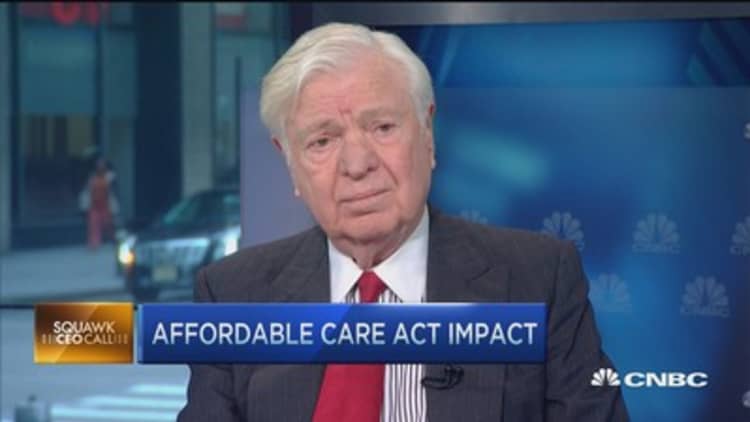The price is still wrong for too many health insurance customers.
Nearly half of all people with individual health insurance plans this year said it's "very" or "somewhat" difficult for them to afford their monthly premiums. ( Tweet this. )
That finding comes in a new survey of customers by the nonprofit Kaiser Family Foundation, which questioned people who bought their individual insurance plans either from government-run Obamacare exchanges or outside of those marketplaces. Forty-six percent of those customers expressed having difficulty paying their premiums.
Read MoreHigh deductibles strain 'underinsured'
The vast majority of Obamacare exchange customers receive a discount on their monthly premiums as a result of subsidies they are issued due to their low or moderate incomes.
Despite that, among individuals with both subsidized and nonsubsidized coverage, "You've got a substantial share saying it's not a great value for the money," said Liz Hamel, director of Kaiser's Public Opinion and Survey Research team.
About four in 10 people surveyed said their plans were only a "fair" or "poor" value based on what they pay. The remaining 59 percent said they were an "excellent" or "good" value. In terms of coverage, 74 percent said their individual plans are "excellent" or "good."
The survey, which questioned 804 adults, had a margin of error of plus or minus 4 percentage points.
Read MoreFew bite at Obamacare special sign-up
Kaiser's latest findings mirror the results seen in a similar survey the organization did in 2014, which was the first year in which Obamacare exchange-sold plans took effect.
But they underscore what Hamel and other researchers have said remains a major barrier to further reducing the number of people in the U.S. who are uninsured by a significant amount: the perception that insurance is too pricey for the uninsured to afford.
"Definitely, affordability is always the biggest concern when you ask the uninsured why they don't have insurance," Hamel said.

To be sure, the launch of Obamacare exchanges, which signed up about 11.4 million people this past open enrollment season, coupled with the expansion of Medicaid benefits in the majority of states, has led to a sharp decrease in the uninsured rate over the past two years.
The unsinured rate in the first quarter of 2015 was 11.9 percent, according to the Gallup polling organization. Right before the opening of the Obamacare exchanges in late 2013, the uninsured rate was a record high 18 percent, Gallup has said.
The Obama administration has touted that reduction and repeatedly stressed the fact that federal subsidies are available to most enrollees on the government-run exchanges.
Read MoreHow bad are we at buying health insurance? Very
"I think in the first or second years of the [Affordable Care Act] you picked up the easier people," Hamel said, particularly those with chronic health conditions who felt a strong financial need for insurance. However, for the remaining uninsured, "I do think that it will be harder and harder over time to convince those people to sign up," she said.
Another finding in Kaiser's survey showed how even people who did sign up for individual health plans have concerns that their coverage won't be good enough to completely protect them financially. Nearly six in 10 respondents said they had fears they would not be able to cover the costs for the medical expenses.
Those concerns were particularly acute people in so-called high deductible coverage, or plans in which they could have to pay $1,500 or more in total out-of-pocket-costs per individual for medical bills. About 40 percent of respondents had such plans.
When asked a hypothetical question about an unexpected $1,500 bill not covered by their plan, 31 percent of people in high-deductible plans said they could pay it off without going into debt. But 43 percent said they would either have to go into credit card debt or borrow to cover the bill. Fifteen percent said they would be unable to pay the bill, and the remainder said they would work out a payment plan with their provider.
Hamel pointed out that there has been a trend toward high-deductible plans for several years. As that trend continues, "more and more people are likely to run into this financial problem," she said.
Kaiser's study comes a day after the Commonwealth Fund issued a report on the problem of 31 million Americans being "underinsured," meaning they have insurance but still face potentially high out-of-pocket medical bills relative to their incomes.
The Commonwealth Fund study found that high deductible plans were playing a greater role in making people underinsured. That, in turn, leaves them at bigger risk of going into debt to pay their bills, having to file for bankruptcy, or skipping medical treatment.


